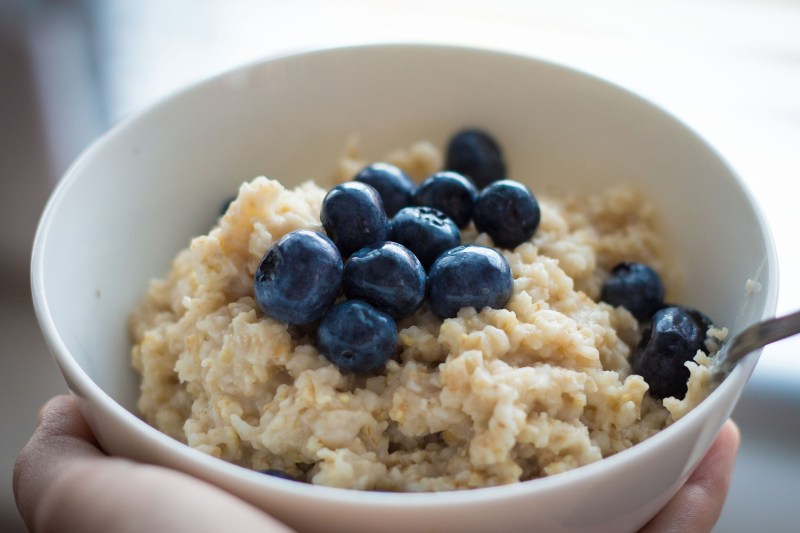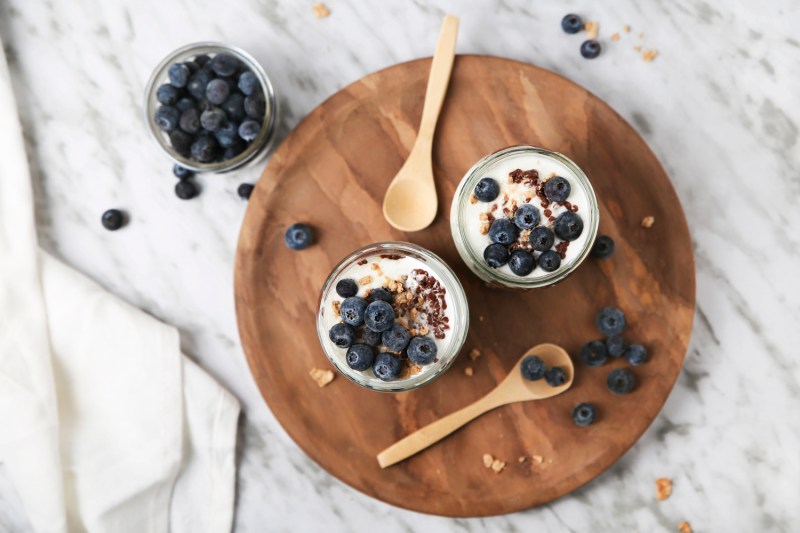
As you approach a new season in your health and wellness journey, you may consider this a great time to try blueberries. Whether or not you’ve been advised to add more fruit to your diet or look for foods to support your exercise regimen, consuming more blueberries may be in your best interest. Here, we’ll consider blueberries’ nutrition profile, as they’re full of antioxidants and components that enhance overall well-being. The antioxidants contained in the berries, the anthocyanins, provide the beautiful blue, red, and purple pigments of the fruits. They also contribute to blueberries’ anti-inflammatory qualities.
The anti-inflammatory qualities make this fruit helpful for gut health and weight management. Blueberries may protect against type 2 diabetes and cardiovascular diseases. Additionally, they can enhance cognitive processing, mood, and memory.
So come along as we discuss the benefits of blueberries and how to include them in your dietary routines.
7 benefits of blueberries

1. Improved gut health
Consuming blueberries can help influence the production of mucin-producing bacteria. This is beneficial because these bacteria protect the gastrointestinal lining, which is associated with a reduced risk of intestinal inflammation. Not only do blueberries encourage the growth of helpful bacteria, but the fiber content also supports efficient digestive function, thus promoting regularity and preventing constipation.
It’s important to note that nearly 70% of the immune system is in the gut, so a healthy and functioning gut can be the key to fending off infections and maintaining the overall wellness of other systems.
2. Reduced inflammation
Another positive aspect of blueberries is that they consist of polyphenols, and these nutrients help fight inflammation. The phytonutrients that contribute to the anti-inflammatory properties help to attenuate vascular function, which benefits weight and glucose balance and protects against conditions like metabolic syndrome and autoimmune disorders.
Polyphenols also help with the production of natural killer cells that help defend against infections. We must consider the connection to gut health because toxin exposures can contribute to a leaky gut, and the body reacts by triggering inflammatory processes. However, with reduced inflammation, you would see boosts in overall health, such as uplifted mood, brighter skin, and greater energy.
3. Antioxidative properties
The phytonutrients in blueberries have antioxidant properties that defend against cellular damage and excess free radicals that are associated with dysfunction and oxidative stress. These actions can inhibit tumor growth, thus providing some protection against the development of various cancers.
It’s important to note that free radicals are useful for combatting infections, but they shouldn’t be greater in number compared to antioxidants. The antioxidants can fight off the damage done by stressors, which can thwart the development of hypertension, heart disease, obesity, and DNA mutations seen in degenerative diseases. Increased consumption of antioxidant sources may improve cellular health and overall longevity.
4. Glucoregulatory properties
These beautiful blue fruits are good sources of fiber, which helps to modulate blood sugar and insulin. Eating more blueberries and taking in the flavonoids contained in them can help with more efficient glucose uptake.
In overweight individuals as well as those with diabetes, there can be improvements in plasma glucose and insulin levels, as well as beneficial weight loss, which could lower the risks of metabolic syndrome. The improved insulin sensitivity can help keep blood sugar levels regulated whether you’re facing prediabetes, diabetes, or weight struggles; the insulin-sensitizing effects also help to protect the gut and various organs from inflammation, biochemical stress, and malfunction.
5. Obesity defense
With inflammation and glucose regulation under control, you will see a better ability to keep weight off. Eating blueberries gives you a higher intake of anthocyanins, and this has been associated with reduced weight gain. Lower fat mass and central adiposity have also been seen in individuals who consume greater amounts of blueberries. Additionally, the fiber content of blueberries can promote increased satiety, allowing you to feel full for longer periods, curb cravings, and ultimately reduce the likelihood of overeating that leads to weight gain.
6. Better heart health
Given the anti-inflammatory and anti-oxidative effects blueberries have on weight and glucose, we must also consider the effects on cardiovascular health. The positive effects of alleviating oxidative stress and weight gain help reduce the risk of cardiovascular events. Some benefits include improved vascular blood flow, regulated blood pressure and cholesterol, and alleviated arterial stiffness.
In individuals with diabetes, lower levels of bad LDL cholesterol and triglycerides have been observed. Ultimately, research has suggested that blueberry consumption has been linked to reduced risk of myocardial infarction and coronary artery disease.
7. Neuroprotective qualities
The positive effects on vascular blood flow, as well as cerebral blood flow, also benefit cognitive function. The results of some research studies have suggested that daily servings of blueberries can improve reaction time, memory, and coordination.
Enjoying your blueberries can lead to slower rates of cognitive decline, protecting you from neurodegenerative diseases such as Parkinson’s disease, Alzheimer’s disease, and dementia. Strengthening your reflexes and reaction time is necessary for long-term coordination and skills, and eating blueberries is a great way to do it. Additionally, the advantageous actions exhibited in the brain can also be beneficial for mental health and mood.
Delicious ways to enjoy the summer fruit

Smoothies
Blending your blueberries into a smoothie or shake can be a great idea, and you can use blueberries alone or pair them with other fruits like bananas or strawberries. You can also incorporate protein powders and veggies.
Toppings
You could add blueberries to meals as toppings. If you decide to have pancakes or waffles, add some blueberries on top or in a cup on the side. You could also add whole blueberries to yogurt cups or into your oatmeal.
Baked within
If you’re a lover of all things classic, you can bake the blueberries into a delicious pie, muffins, or sweet bread. You can try these recipes with whole wheat flour or with chia seeds as an egg replacement.
Blueberry mocktails
Whether you’re sitting poolside or you pack your things to head down to the beach, consider enjoying a blueberry mocktail. One example is the blueberry ginger lime mocktail. You could use the ingredients of your choice, but note that it’s always wonderful combined with fresh herbs.
Mixing fresh herbs and blueberries can provide a refreshing drink packed with nutrients and loaded with antioxidants. This refreshing choice is perfect for the pool, baby showers, barbecues, and balmy, breezy summer dinners.
Frequently asked questions
Is it good to eat blueberries every day?
There doesn’t seem to be any harm in eating blueberries daily. These blue beauties are versatile enough to be eaten each day, whether in yogurt or cereal or even eaten plain. Regular consumption of blueberries can be beneficial for memory and delaying age-related neurodegeneration. Daily servings of blueberries can benefit cardiovascular and cognitive health.
Is there a downside to eating too many blueberries?
As with many treats, there may be too much of a good thing, and you may see adverse effects. Blueberries contain vitamin K, a nutrient that is sensitive to prescription blood thinners, so suddenly raising blueberry consumption could lead to increased bleeding risk.
Additionally, blueberries contain salicylates, the active ingredient in aspirin. If you’re sensitive to aspirin, you may experience headaches, vomiting, nausea, and GI discomfort if you eat an excessive amount of blueberries. You would also want to monitor consumption, especially if you have diabetes, because blueberries are generally safe but can lead to hypoglycemia, a detrimental decline in blood sugar.
Are blueberries high in sugar?
Blueberries do not contain excessively high amounts of sugar. One cup contains 21 grams of carbohydrates, the average serving of fruit. Blueberries have a smaller glycemic load and do not cause blood sugar levels to spike. This is why blueberries are often considered a great fruit for people with diabetes to eat, as they are good sources of fiber and slow down sugar absorption in the bloodstream.
Final thoughts
Overall, there are many advantages to eating blueberries. The nutritional content is very beneficial to total health. Antioxidants like vitamin C and anthocyanins help fight infections and keep the body’s systems operating smoothly. The phytonutrients contained within blueberries are crucial for gut health and the immune system, which also sees positive results throughout the entire body. Additionally, the high vitamin K content bolsters all-encompassing wellness, such as benefits for bone health, skin, and blood coagulation.
There are various ways to enjoy your blueberries all summer long! Blended into smoothies, baked into desserts, or paired with oats and grains are just a few ways you can maximize their splendor. Eating the rainbow can provide you with many beneficial sources of vitamins and minerals that support your health. As you do so, remember the blue and purple anthocyanins that are protective against cancers, cardiovascular diseases, and other metabolic disorders.



